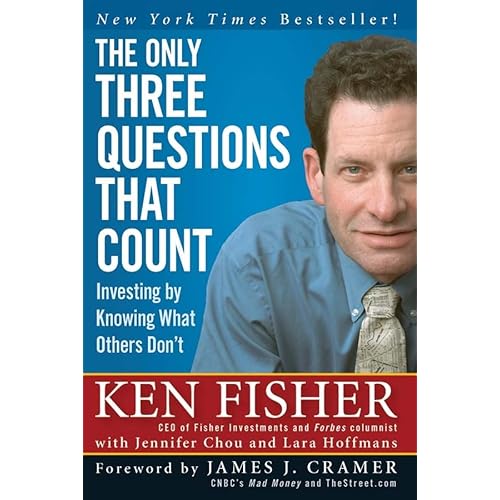 Ken Fisher is one of the richest men in America and is a renowned investment manager, following in the footsteps of his - also famous - investor father, Philip Fisher. Each approaches/ed investing with different styles on how to make money.
Ken Fisher is one of the richest men in America and is a renowned investment manager, following in the footsteps of his - also famous - investor father, Philip Fisher. Each approaches/ed investing with different styles on how to make money.Philip was a proponent of a concentrated basket of stocks, chosen in relatively few sectors in which one might gather some deeper knowledge over time, and in which relatively exclusive and important information ("scuttlebutt") might be known.
Ken Fisher, the author of this book, on the other hand is more of a top-down, "value-screen" guy, who recommends staying relatively close, asset-class percentage-wise, to a broad-based benchmark. He also recommends a broad portfolio of about 50 stocks. Despite the obvious differences in styles, each style has proven to be successful, respectively, for father and son, and for those who follow. But success only happens for those followers who are willing and able to ask the suitable questions needed to succeed for each investment style.
Ken's style revolves around asking the following three questions:
(1) What do you believe that is actually false?
(2) How can I fathom what others find unfathomable?
(3) What the heck is my brain doing to blindside me now?
Asking the first question calls on you to challenge yourself to find or analyze data to show what you believe is actually false. By uncovering this, we can invest in a different way than we had previously, and in a a different way that many people believe to be true (which is actually false), and, thus, swimming before approaching tide is seen by all, succeed in outperforming the crowd. Catching the early rise of the wave, if you will. Using this question, Ken purports to show that investing when price-earnings ratios (PEs) are high isn't a sign of poor returns to come. This is his big signature statement that challenges a long-held market axiom. More on this in another posting to follow.
The second question calls on you to look for relationships where some (sensible) economic theory can explain what might occur in the future, based on demonstrated relationship to something else that has proven to have some predictive power (correlation). The question can also be stated as "What causes X?".
The final question relates to considering how various behavioural cognitive reasoning flaws might be sabotaging your success as an investor. I have written about many of these factors on my blog before, and these are often highlighted at Abnormal Returns or CXO Advisory, and it's nice to see that the importance of these are becoming more widely written about.
In general, I found the book to be worthwhile, filled with lots of practical tips and thoughts; and the application of the questions cannot but help make you a better, more astute investor over time.
However, I have two issues with the book:
Firstly, I find that Mr. Fisher is very condescending or even downright insulting to some specific people, or classes of people - based on their chosen profession. I find the first to be juvenile and needlessly insulting, while in the second instance he engages in negatively stereotyping a "class" of people, an attribute I frankly have some trouble understanding in a person of his obvious intelligence. In this regard, I think Mr. Fisher should try to display a little more maturity, and tact. As you can probably tell, this behaviour irritated me to a considerable degree.
Secondly, I have some issues with Mr. Fisher purporting to show that high PEs don't denote high market risk. My problem with the posing of his question, rationale and presentation of the "facts" in relation to this will be discussed in a future posting.
Until then, stay safe and use the three questions to consider the investment world in general, and the questions answered in Mr. Fisher's book in particular.

JW
The Confused Capitalist

